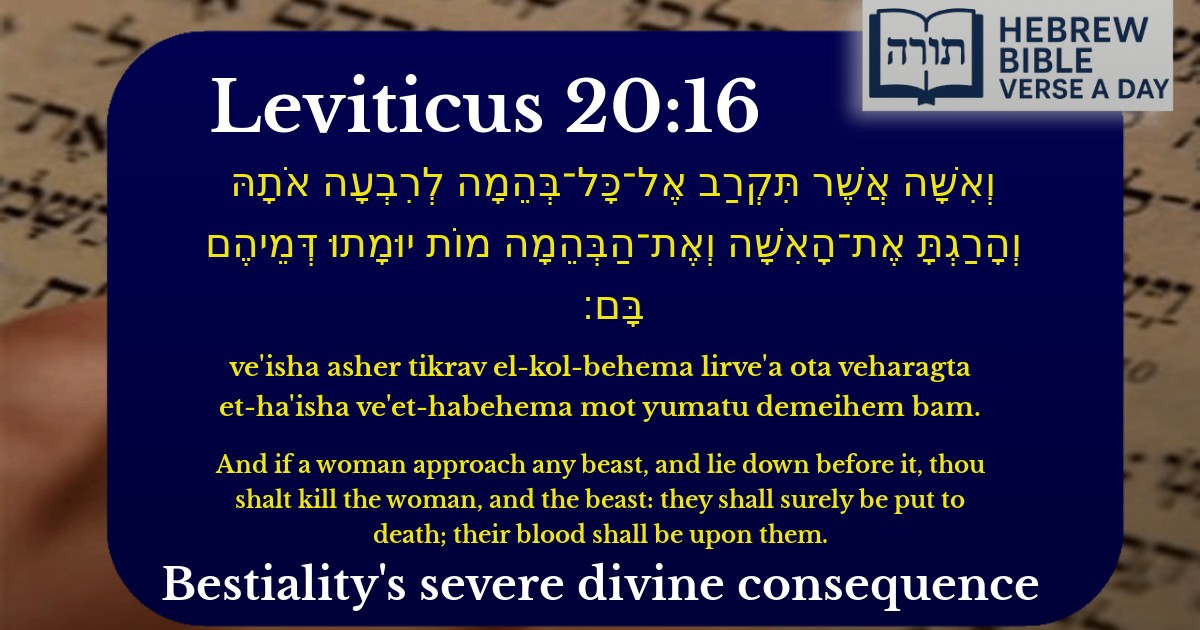Join Our Newsletter To Be Informed When New Videos Are Posted
Join the thousands of fellow Studends who rely on our videos to learn how to read the bible in Hebrew for free!
Hebrew Text
וְאִשָּׁה אֲשֶׁר תִּקְרַב אֶל־כָּל־בְּהֵמָה לְרִבְעָה אֹתָהּ וְהָרַגְתָּ אֶת־הָאִשָּׁה וְאֶת־הַבְּהֵמָה מוֹת יוּמָתוּ דְּמֵיהֶם בָּם׃
English Translation
And if a woman approach any beast, and lie down before it, thou shalt kill the woman, and the beast: they shall surely be put to death; their blood shall be upon them.
Transliteration
Ve'isha asher tikrav el-kol-behema lirve'a ota veharagta et-ha'isha ve'et-habehema mot yumatu demeihem bam.
Hebrew Leining Text
וְאִשָּׁ֗ה אֲשֶׁ֨ר תִּקְרַ֤ב אֶל־כׇּל־בְּהֵמָה֙ לְרִבְעָ֣הֿ אֹתָ֔הּ וְהָרַגְתָּ֥ אֶת־הָאִשָּׁ֖ה וְאֶת־הַבְּהֵמָ֑ה מ֥וֹת יוּמָ֖תוּ דְּמֵיהֶ֥ם בָּֽם׃
וְאִשָּׁ֗ה אֲשֶׁ֨ר תִּקְרַ֤ב אֶל־כׇּל־בְּהֵמָה֙ לְרִבְעָ֣הֿ אֹתָ֔הּ וְהָרַגְתָּ֥ אֶת־הָאִשָּׁ֖ה וְאֶת־הַבְּהֵמָ֑ה מ֥וֹת יוּמָ֖תוּ דְּמֵיהֶ֥ם בָּֽם׃
🎵 Listen to leining
Parasha Commentary
📚 Talmud Citations
This verse is quoted in the Talmud.
📖 Sanhedrin 76a
The verse is discussed in the context of the laws regarding bestiality and the punishment for such acts.
📖 Keritot 3a
The verse is referenced in a discussion about the severity of certain sins and their corresponding punishments.


Prohibition of Bestiality and Its Punishment
The verse (Vayikra 20:16) addresses the severe prohibition of bestiality, specifically when a woman engages in such an act. The Torah mandates the death penalty for both the woman and the animal involved, emphasizing the gravity of this transgression. Rashi explains that the phrase "דְּמֵיהֶם בָּם" ("their blood shall be upon them") underscores that their deaths are a direct consequence of their own actions, bearing full responsibility for their sin.
Halachic Implications
According to Rambam (Hilchos Issurei Biah 1:15-16), bestiality is classified as one of the איסורי עריות (forbidden sexual relations) and is punishable by סקילה (stoning), the most severe form of capital punishment in Jewish law. The inclusion of the animal in the punishment serves as a deterrent and a public declaration of the abhorrence of such acts.
Rationale for Killing the Animal
The Talmud (Sanhedrin 54a) discusses why the animal must be executed, stating that it is to prevent the animal from becoming a stumbling block for others. The Midrash (Toras Kohanim 20:14) adds that the animal is killed because it was an instrument of sin, and its destruction serves as a lesson to society about the severity of violating Torah law.
Moral and Spiritual Consequences
The Sefer HaChinuch (Mitzvah 188) explains that this prohibition safeguards the sanctity of human relationships and distinguishes mankind from beasts. By engaging in such acts, a person degrades their divine image (צלם אלוקים) and disrupts the moral order established by Hashem.